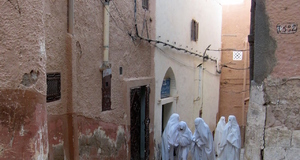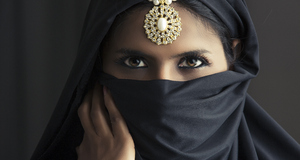Democracy and Islamism in Algeria: Islamocracy?
By
2011, Vol. 3 No. 04 | pg. 2/2 | « The distinction between fundamental/radical Islam and Islam itself is a crucial one. Many Islamic countries are also secularized. For example, the population of Turkey is 99.8% Muslim21 but the country is governed as a parliamentary representative democracy. Islam as a religion is not inherently in contradiction to democracy, but it is the people that seek to promote either one that find themselves in conflict. In October 2005, Algerians approved a controversial referendum sponsored by President Bouteflika, the Charter on Peace and National Reconciliation, which grants amnesty to all Islamists and military officials involved in the country's bloody civil war.22 Though such a referendum casts a wide net while failing to incorporate accountability, perhaps this is a step in the right direction of narrowing the gap between Islam and democracy in Algeria. After all, "Algerians regard their society as unique in the region, with its own complexities-- not entirely Arab or European, but stamped with certain European trappings after more than a century of French colonial rule. These Western influences include widespread use of the French language, a taste for local wine, comparatively free association between men and women and other habits that would be difficult to supplant with the type of conformity demanded in more fundamentalist states."23 Algeria seems to somehow be stuck between the ancient past vis-à-vis strict adherence to Islamic law; the more recent past, and its imprint of colonialism; and of course, which direction to take the country into in the future. Though democratic elections do not make a democracy, they are an integral part of the process. However, barring Islamist parties from participating in such elections seems hypocritical, in spite of its logical reasoning. Democracy is not a panacea, nor does it come into being overnight. It is imperfect and fragile and to impose it upon people that do not want it, flies in the very face of what a democracy is supposed to represent. According to the CIA World Factbook, "Longstanding problems continue to face Bouteflika in his second term, including the ethnic minority Berbers' ongoing autonomy campaign, large-scale unemployment, a shortage of housing, unreliable electrical and water supplies, government inefficiencies and corruption, and the continuing - although significantly degraded - activities of extremist militants."24 A country cannot have a true democracy without infrastructure and conversely, infrastructure with no oversight and implementation is, for all intents and purposes, useless. However, there is no simple nor right answer in deciding which could or should come first. For starters, a more open media would benefit the people in that they would have a variety of sources from which to learn about current events both at home and abroad. Moreover, greater media access would give the people of Algeria a stronger voice to express their will, be it in the name of Islam, democracy, or a hybrid of the two. There needs to be more intense focus on economic development, lest those in need of social welfare seek to better their lives through associations with radical or fundamentalist groups, which often employ terrorist tactics. It is a vicious cycle, but not one that is unbreakable. The citizens of Algeria, as well as its allies, must ensure that their plight remains on the agenda of the international community, even if it is not at the forefront. It is not only countries in dire crisis or a state of emergency that need attention and aid, but also those who are working on maintaining a tenuous democracy and peace, especially since the horrors of the civil war are presumably still fresh in the minds of the majority of the Algerian citizenry.References1) Abdelaziz, Testas. "Economic and Political Explanations of Algeria's Human Rights Violations," International Journal of Human Rights, 2004, 8, 4, winter, 399-411. 2) Berman, Sheri. "Islamism, Revolution and Civil Society," Perspectives on Politics, 2003, 1, 2, June, 257-272 3) Slisli, Fouzi. "The Western Media and the Algerian Crisis," Race & Class, 2000, 41, 3, 43-57. 4) Political Islam and democracy: the case of Algeria, Lahouari Addi, Professor of Political Sociology at the IEP of Lyon, in A. Hadenius, Democracy's Victory and Crisis, Cambridge University Press, 1997 5) Central Intelligence Agency, The World Factbook 6) Yahia H. Zoubir "Algerian Islamists' conception of democracy". Arab Studies Quarterly (ASQ). Summer 1996. 7) New York Times, LETTER FROM NORTH AFRICA; Islam and Democracy: Algerians Try to Blaze a Trail, Craig C. Smith, published April 14, 2004 8) Algeria's Voters Uninspired as Limited Democracy Slowly Evolves, Craig Whitlock, Washington Post Foreign Service, Wednesday, May 16, 2007; Page A09 9) The Media and Democracy in Algeria, Ali Djerri, Paper presented to the APFW Annual Conference May 2002 10) North Africa: Under Attack, and Relying on Repression, New York Times, Craig S. Smith, April 15, 2007 11) Algeria: History, Geography, Government and Culture, U.S. Department of State, Country Profiles 12) Algerians United and Divided by Faith, Howard Schneider, Washington Post Foreign Service, October 5, 1999, Page A11 Endnotes1.) Abdelaziz, Testas. "Economic and Political Explanations of Algeria's Human Rights Violations," International Journal of Human Rights, 2004, 8, 4, winter, 399-411. 2.) Berman, Sheri. "Islamism, Revolution and Civil Society," Perspectives on Politics, 2003, 1, 2, June, 257-272 3.) Slisli, Fouzi. "The Western Media and the Algerian Crisis," Race & Class, 2000, 41, 3, 43-57. 4.) Political Islam and democracy: the case of Algeria, Lahouari Addi, Professor of Political Sociology at the IEP of Lyon, in A. Hadenius, Democracy's Victory and Crisis, Cambridge University Press, 1997 5.) Hadenius, page 10 6.) Hadenius, page 4 7.) Central Intelligence Agency, The World Factbook, https://www.cia.gov/library/publications/the-world-factbook/geos/ag.html#People, accessed on October 4, 2007 8.) Yahia H. Zoubir "Algerian Islamists' conception of democracy". Arab Studies Quarterly (ASQ). Summer 1996. 9.) Zoubir, 1996 10.) New York Times, LETTER FROM NORTH AFRICA; Islam and Democracy: Algerians Try to Blaze a Trail, Craig C. Smith, published April 14, 2004 11.) Smith, 2004 12.) Smith, 2004 13.) Algeria: democracy 'on hold.' Contemporary Review, March, 1993 by Jonathan G. Farley 14.) Algeria's Voters Uninspired as Limited Democracy Slowly Evolves, Craig Whitlock, Washington Post Foreign Service, Wednesday, May 16, 2007; Page A09 15.) The Media and Democracy in Algeria, Ali Djerri, Paper presented to the APFW Annual Conference May 2002 16.) Djerri, page 5 17.) North Africa: Under Attack, and Relying on Repression, New York Times, Craig S. Smith, April 15, 2007 18.) Smith, 2007 19.) Smith, 2007 20.) Smith, 2007 21.) Central Intelligence Agency World Factbook, Turkey 22.) Algeria: History, Geography, Government and Culture, U.S. Department of State, Country Profiles 23.) Algerians United and Divided by Faith, Howard Schneider, Washington Post Foreign Service, October 5, 1999, Page A11 24.) Central Intelligence Agency World Factbook, Algeria Suggested Reading from Inquiries Journal
Inquiries Journal provides undergraduate and graduate students around the world a platform for the wide dissemination of academic work over a range of core disciplines. Representing the work of students from hundreds of institutions around the globe, Inquiries Journal's large database of academic articles is completely free. Learn more | Blog | Submit Latest in International Affairs |


















